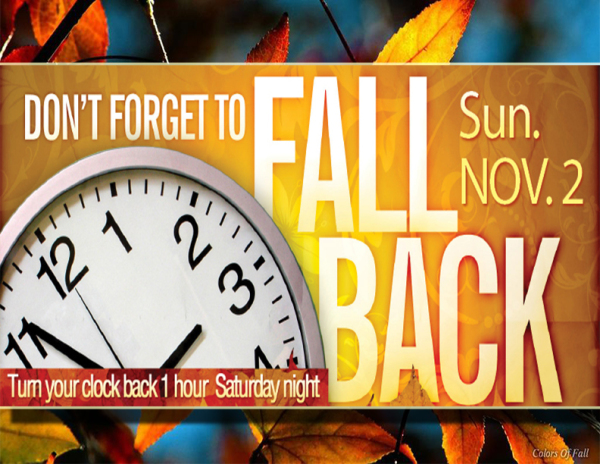It’s that time of year again, when we reset our clocks and try to readjust…
Time to Fall Back! The Debate on Daylight Savings Time Continues…

Don’t forget that Daylight Savings Time (DST) ends at 2:00 a.m. (the clock gets turned back to 1:00 a.m.) on Sunday, November 2, 2014!
Since the introduction of modern daylight saving time (DST) in the early 20th century, many countries have been adjusting the clock one hour ahead in spring and winding it back by one hour during fall. The practice has been both praised and criticized. Adding daylight to evenings benefits retailing, sports, and other activities that exploit sunlight after working hours, but can cause problems for evening entertainment and other occupations tied to the sun (such as farming) or to darkness (such as firework shows). Although an early goal of DST was to reduce evening use of incandescent lighting (formerly a primary use of electricity) modern heating and cooling usage patterns differ greatly, and research about how DST currently affects energy use is limited or contradictory. Let’s take a look at the pros and cons of springing forward and falling backward…
Pros
There are many important advantages to DST. Numerous types of crime, including assault and theft, peak during evening darkness, while the corresponding rates are very low during early morning. Happily, DST allows society to take advantage of the fact that criminals are late to rise and late to bed.
The crime reduction associated with prolonged daylight helps individuals and businesses alike. U.S. retailers lost $42.2 billion to theft from mid-2008 to mid-2009, according to the Global Retail Theft Barometer, so a reduction in theft could mean big savings. The impact would be felt by mom-and-pop and big-box stores alike because 92% of retailers were theft victims in 2009, the National Retail Federation reports.
Most important, however, is the fact that DST may help save lives. Extending DST year-round would save more than 350 American lives annually in reduced traffic fatalities during the evening. According to the Insurance Institute for Highway Safety, the change from daylight to twilight causes a 300% increase in fatal pedestrian crashes alone. Having this change occur one hour later saves lives because fewer motorists are on the road then.
Cons
DST has mixed effects on health. It alters sunlight exposure; whether this is beneficial depends on one’s location and daily schedule, as sunlight triggers Vitamin D synthesis in the skin.
Transitions associated with the start and end of DST disturb sleep patterns, and make people restless at night, which results in sleepiness the next day, even during a “fall back” period, since when we fall back, we might have trouble adjusting to going to sleep “later” after the time change. This sleepiness leads to a loss of productivity and an increase in “cyberloafing” in which people muck around more on the computer instead of working. That finding was from a 2012 report in the Journal of Applied Psychology.
During the first week of DST (in the late winter) there’s a spike in heart attacks, according to a study in the American Journal of Cardiology (and other previous studies). That’s because losing an hour of sleep increases stress and provides less time to recover overnight. The opposite is true when we gain an extra hour of sleep. The end of DST causes a decrease in heart attacks.
A study published in 2008 in the Journal of Sleep and Biological Rhythms found an uptick in suicides in Australian men during the first weeks after DST.
Night owls are more bothered by the time changes than morning people. For some, it can take up to three weeks to recover from the sleep schedule changes, according to a 2009 study in the Journal of Sleep Medicine. For others, it may only take a day to adjust to this new schedule.
When it comes to DST, there is really no consensus on whether the “good” outweighs the “bad.” So, unless anything changes, we will all continue to “spring forward” and “fall back.”
Do you think we should continue changing our clocks twice a year? Comment below with your thoughts.
Source:
http://www.timeanddate.com/time/dst/daylight-saving-debate.html
https://www.bloomberg.com/businessweek
http://www.businessinsider.com/health-and-economic-effects-of-daylight-saving-time-2013-10



